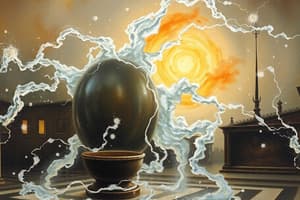Podcast
Questions and Answers
What is a controlled variable?
What is a controlled variable?
- A variable that is manipulated to observe its effect.
- A variable that can change in response to another variable.
- A factor in an experiment that remains constant. (correct)
- The outcome that is measured in an experiment.
Which of the following best describes kinetic energy?
Which of the following best describes kinetic energy?
- Energy that transforms from one form to another.
- Energy stored due to an object's position.
- Energy resulting from an object's motion. (correct)
- Energy transferred when a force moves an object.
Which scenario represents a dependent variable?
Which scenario represents a dependent variable?
- The type of fertilizer used on a crop.
- The growth of a plant observed over time. (correct)
- The amount of light in a photosynthesis experiment.
- The temperature of water in a boiling experiment.
What does Newton's First Law state?
What does Newton's First Law state?
Which of the following is NOT a type of energy?
Which of the following is NOT a type of energy?
What strategy is recommended for answering matching questions?
What strategy is recommended for answering matching questions?
Which term best explains why kinetic energy is measured in joules?
Which term best explains why kinetic energy is measured in joules?
What is the primary focus when answering short answer questions?
What is the primary focus when answering short answer questions?
What does kinetic energy depend on?
What does kinetic energy depend on?
Which of the following describes potential energy?
Which of the following describes potential energy?
What defines mechanical energy?
What defines mechanical energy?
Which energy type is associated with vibrations traveling through a medium?
Which energy type is associated with vibrations traveling through a medium?
Which of the following represents thermal energy?
Which of the following represents thermal energy?
What type of energy is produced by a battery powering a device?
What type of energy is produced by a battery powering a device?
Radiant energy is best described as:
Radiant energy is best described as:
Nuclear energy can be released through which process?
Nuclear energy can be released through which process?
Which example demonstrates potential energy?
Which example demonstrates potential energy?
Which of the following statements is true about kinetic and potential energy?
Which of the following statements is true about kinetic and potential energy?
How is energy transformed when using a catapult?
How is energy transformed when using a catapult?
Sound energy can be best described as:
Sound energy can be best described as:
Which energy type is produced in a nuclear power plant?
Which energy type is produced in a nuclear power plant?
What type of energy is associated with a hot coffee cup?
What type of energy is associated with a hot coffee cup?
Flashcards
Controlled variable
Controlled variable
A factor in an experiment that is kept constant to ensure that the results are due to the independent variable.
Kinetic Energy
Kinetic Energy
The energy of motion, measured in joules.
Newton's First Law
Newton's First Law
An object at rest stays at rest, and an object in motion stays in motion at a constant speed and direction unless acted upon by a net force.
Newton
Newton
Signup and view all the flashcards
Force
Force
Signup and view all the flashcards
Acceleration
Acceleration
Signup and view all the flashcards
Velocity
Velocity
Signup and view all the flashcards
Mass
Mass
Signup and view all the flashcards
Potential Energy
Potential Energy
Signup and view all the flashcards
Mechanical Energy
Mechanical Energy
Signup and view all the flashcards
Thermal Energy
Thermal Energy
Signup and view all the flashcards
Sound Energy
Sound Energy
Signup and view all the flashcards
Electric Energy
Electric Energy
Signup and view all the flashcards
Radiant Energy
Radiant Energy
Signup and view all the flashcards
Nuclear Energy
Nuclear Energy
Signup and view all the flashcards
Study Notes
Multiple-Choice Questions
- Understand key definitions and concepts.
- Expect questions on definitions, examples, and scenarios.
- Identify and eliminate clearly incorrect answers.
Matching Questions
- Master definitions and examples for energy types, Newton's Laws, and forces.
- Group similar concepts (e.g., types of energy) together for easier matching.
- Look for keywords like "motion," "stored energy," "heat," "vibrations," "electromagnetic waves," "nucleus" to identify the corresponding energy type.
Short Answer Questions
- Answer concisely and directly, using complete sentences.
- Employ correct scientific terminology (e.g., force, mass, acceleration, velocity).
- Provide examples and explanations when needed.
Essay/Paragraph Questions
- Introduce the topic briefly (e.g., Newton's Laws, energy types).
- Provide specific examples and explanations, demonstrating understanding.
- Conclude by summarizing key points and their real-world applications.
Key Study Topics
- Scientific Method: Steps in the scientific method.
- Variables: Independent, dependent, and controlled variables.
- Types of Energy: Definitions and examples (kinetic, potential, mechanical, thermal, sound, electric, radiant, nuclear).
- Newton's Laws: Each law's description and application.
- Forces: Contact and noncontact forces.
Types of Energy and Definitions
- Kinetic Energy: Energy of motion; KE = 1/2mv². Example: a moving car.
- Potential Energy: Stored energy due to position or condition. Example: a ball held high or a stretched spring.
- Mechanical Energy: Total energy (kinetic + potential). Example: a roller coaster.
- Thermal Energy: Energy due to particle motion. Example: hot coffee.
- Sound Energy: Energy carried by sound waves (vibrations). Example: music.
- Electric Energy: Energy carried by electric currents. Example: a lit light bulb.
- Radiant Energy: Energy carried by electromagnetic waves. Example: sunlight.
- Nuclear Energy: Energy stored in the nucleus of atoms. Example: nuclear power plants.
Studying That Suits You
Use AI to generate personalized quizzes and flashcards to suit your learning preferences.



